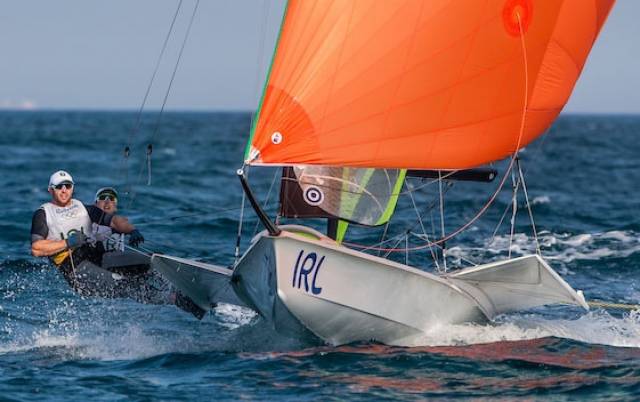Ireland's Men's 49er Skiff Ryan Seaton and Matt McGovern from Ballyholme Yacht Club in Northern Ireland are seventh overall after nine sailed races in Rio. Dun Laoghaire's Andrea Brewster and Saskia Tidey are 12th after nine races in their 20–boat 49erfx fleet. It was the most frustrating day so far of the Olympic sailing competition with the wind refusing to play fair on Guanabara Bay.
49er Skiff
Perhaps inspired by French gold and bronze in the Windsurfing the previous day, Julien d'Ortoli and Noe Delpech fired their way up the rankings into fourth place after mastering the Copacabana course with two firsts and a third place. This puts the French just two points behind the third-placed Australians, reigning Olympic Champions Nathan Outteridge and Iain Jensen.
Meanwhile it's business as usual for the ever dominant Peter Burling and Blair Tuke (NZL) whose scores of 2,3,1 have opened up an 18-point lead over Erik Heil and Thomas Ploessel (GER). Even if the gold is beginning to get away from the Germans, they do at least have a healthy 15-point lead over the Aussies, with just three qualifying races remaining before the Medal Race.
Burling said, "We're pleased with three low scores, the boat was going really fast. We had some beautiful conditions for racing but got hit by a massive squall on the way in. It was maybe 45 or 50 knots.” Tuke added, "A south-west front came in and it went from 11 knots to more than 40 knots in the space of ten minutes.” Even the four-time World Champions capsized in the storm-force conditions. "We struggled to stay upright just with the mast up. Some massive waves out there, just happy to be back on shore,” said Burling, shivering and itching to get back to checking over the boat for any damage.
The Germans seemed to enjoy the mad ride in through the storm a little more than the Kiwis. "We ragged it quite fast on the way in,” said Heil. "But what lucky timing. Just after the last guy came across the finish line, the breeze came in 130 degrees from the other side, and with massive force. Even with just the mast up and no sails, we still needed to get on the trapeze to stop the boat tipping over. We have some boat work to do, we have damaged the sails, we have to check the mast.”
Noe Delpech was barely thinking about what a good day he'd had after getting ashore - just happy to be in one piece. "We had three good starts and are very happy with our speed and strategy today. But then there was the wind that arrived straight afterwards. We capsized many times. The mainsail went flying through the air and it fell in the water but our coach managed to save it before we lost it. We had a bad last hour on the water. The sails are not in great condition but I think we are OK mostly.”
Delpech was pleased to have closed in on the podium, but like all Olympic sailors never likes to get ahead of himself. "We are two points behind the bronze medal position, so yes, for sure we can start thinking about the options to get a medal, but we have still three important races to do tomorrow. We just go race by race.”
The Skiffs will have to work quickly with another three races scheduled for tomorrow which looks to be a busy day. The Laser, Laser Radial, Finn and Nacra 17 will all have their Medal Race due to the postponements from today.
Women's Skiff – 49erFX
Tamara Echegoyen and Berta Betanzos (ESP) fired two bullets from today's three races on the Niterói course moving the reigning World Champions to the top of the scoreboard. Behind them are two former World Champion crews, Alex Maloney and Molly Meech (NZL) who are four points behind the Spanish in second, and Martine Grael and Kahena Kunze (BRA) just one point behind the Kiwis in third overall.
Although previous overnight leaders Jena Hansen and Katja Salskov-Iversen (DEN) scored a second in the last race of the day their earlier scores of 9,16 have hurt the Danish team who are now fourth overall. However, the Danes are only nine points off the lead and there are still three more qualifying races scheduled for Tuesday before Thursday's Medal Race.
Echegoyen, the London 2012 Olympic Champion in match racing, commented, "We are very happy, we have sailed very well today. It was very important to be very open minded, to be able to adapt ourselves to what was happening. We were well prepared for today's three races, both in terms of understanding the conditions with our meteorologist and also regarding the tactics.
"In the two first races it was clear where to go, but the third one was really crazy and we just sailed with the wind shifts. It has been a good day, but also quite difficult, we have had to work a lot. These results give us the confidence to keep on going in this way. Now we are leading but we are all very close on points. Still three races and the Medal Race ahead, so we have to go step by step and keep on going.”





























































